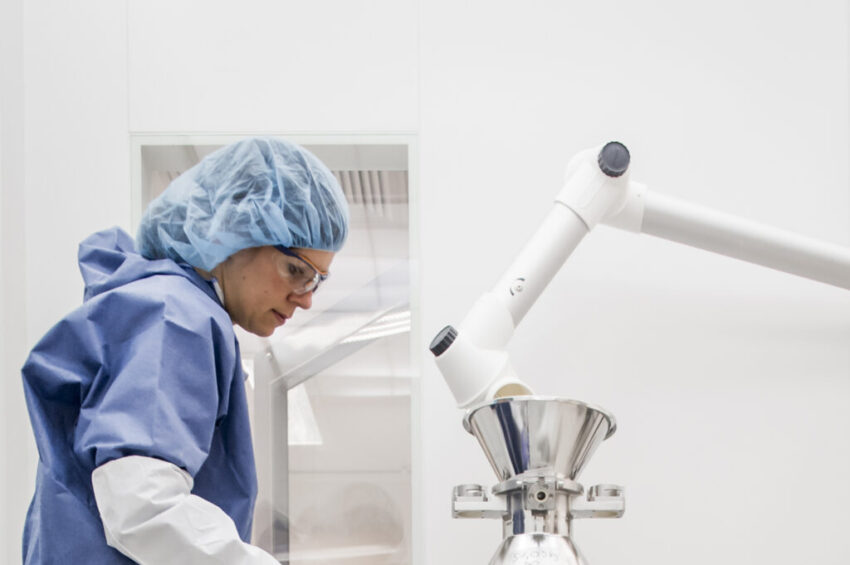A technician works inside an AstraZeneca laboratory in this undated photo. The pharmaceutical giant announced plans to build its largest drug manufacturing facility in Virginia. (Photo courtesy of AstraZenica)
In a vote of confidence for Virginia’s growing life sciences sector, pharmaceutical giant AstraZeneca announced plans to build its largest drug manufacturing facility in the world somewhere in the commonwealth — marking the company’s single biggest investment ever.
The U.K.-based biopharmaceutical company said the new facility will be a cornerstone of its $50 billion U.S. expansion plan by 2030. The site, which will focus on producing treatments for cancer, respiratory illness, and rare diseases, is expected to create hundreds of highly skilled jobs and use AI, automation, and advanced data analytics to optimize production.
Gov. Glenn Youngkin, who joined AstraZeneca CEO Pascal Soriot and White House National Economic Council Director Kevin Hassett at the announcement in Washington, D.C., said the move represents a landmark moment for Virginia’s economy.
“I want to thank AstraZeneca for choosing Virginia as the cornerstone for this transformational investment,” Youngkin said. “This project will set the standard for the latest technological advancements in pharmaceutical manufacturing, creating hundreds of highly skilled jobs and helping further strengthen the nation’s domestic supply chain.”
U.S. Sen. Tim Kaine, D-Va., also praised the deal, pointing to the commonwealth’s long-standing push to bring drug manufacturing back onshore. “AstraZeneca is investing billions to build a manufacturing facility in Virginia, creating hundreds of jobs,” Kaine said.
“As a city councilman, mayor, governor, and senator, I’ve been proud to help lay the groundwork for Virginia’s leadership in onshoring the manufacturing of essential medicines and their ingredients.”
The company said it chose Virginia because of its research institutions, skilled workforce, and commitment to innovation in advanced manufacturing.
The Mercury has reached out to both Youngkin’s office and Kaine to learn more about what financial incentives, tax breaks, or infrastructure commitments Virginia may have offered as part of the recruitment effort.
AstraZeneca’s record-breaking bet on Virginia comes at a critical economic juncture for the commonwealth, which is grappling with rising job losses — particularly in its large federal sector.
According to the U.S. Bureau of Labor Statistics, Virginia posted the only statistically significant uptick in unemployment in June, with its rate climbing to 3.5% — marking six consecutive months of increases. The state has lost an estimated 11,100 federal positions this year alone, primarily affecting Northern Virginia’s federal workers and contractors .
The University of Virginia’s Weldon Cooper Center forecasts total job losses could reach 32,000 by year’s end, fueled by federal layoffs and reduced contracting.
At its new drug substance manufacturing facility, AstraZeneca aims to produce key ingredients for treatments in oncology, cardiovascular, renal and metabolic diseases, respiratory and immunological conditions, and other rare disorders.
CEO Soriot said the investment underscores both the company’s global ambitions and confidence in America’s biopharma future.
“Today’s announcement underpins our belief in America’s innovation in biopharmaceuticals and our commitment to the millions of patients who need our medicines in America and globally,” Soriot said. “It will also support our ambition to reach $80 billion in revenue by 2030.”
He added that the partnership with Virginia reflects the state’s desire to create high-wage, science-driven jobs while helping bolster the U.S. domestic medicine supply chain.
The announcement was met with enthusiasm across Virginia’s political spectrum.
Virginia Secretary of Commerce and Trade Juan Pablo Segura called the project proof that Virginia is becoming a premier hub for the life sciences.
“With our top-tier research institutions, skilled workforce, and commitment to advanced manufacturing, we are well-positioned to support the breakthroughs that improve lives around the world,” Segura said.
State lawmakers echoed the sentiment. Del. Luke Torian, D-Prince William, who chairs the House Appropriations Committee, said the project reflects years of strategic investment in science and manufacturing.
“We welcome AstraZeneca to the commonwealth and look forward to continued growth in Virginia’s life sciences sector,” Torian said.
Sen. Creigh Deeds, D-Charlottesville, a senior member of the Senate Finance and Appropriations Committee, called the partnership a chance to “reshore our critical pharmaceutical supply chain” and elevate Virginia’s bioscience economy to a global level.
AstraZeneca, which sells medicines in over 125 countries, said the new Virginia facility will become a central piece of its global production network. The company has not yet publicly disclosed the exact location of the future plant or a construction timeline.
The announcement comes at a time of renewed national focus on securing pharmaceutical manufacturing within the U.S., particularly after pandemic-era supply chain disruptions. AstraZeneca’s decision positions Virginia at the center of that effort — which stakeholders hope will invite other industry leaders to follow suit.
AstraZeneca has been increasingly focused on the U.S. market, which generated more than 40% of the company’s total revenue in 2024.
Even before President Donald Trump returned to office, the pharmaceutical giant had been prioritizing expansion in the United States, the world’s largest pharmaceutical market, valued at $635 billion.
Its latest move to expand its manufacturing footprint on American soil comes as the Trump administration signals a more aggressive stance toward the industry.
The president has floated the idea of new import tariffs on pharmaceuticals and is pressuring companies to produce more of their medicines domestically rather than relying on overseas facilities.
Although the pharmaceutical sector has largely avoided being swept into previous trade disputes, Trump has also renewed his push to lower U.S. drug prices to levels comparable with those in other countries.
YOU MAKE OUR WORK POSSIBLE.
Click this link for the original source of this article.
Author: Markus Schmidt
This content is courtesy of, and owned and copyrighted by, https://www.virginiamercury.com and its author. This content is made available by use of the public RSS feed offered by the host site and is used for educational purposes only. If you are the author or represent the host site and would like this content removed now and in the future, please contact USSANews.com using the email address in the Contact page found in the website menu.








